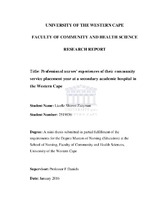| dc.contributor.advisor | Daniels, Felicity | |
| dc.contributor.author | Zaayman, Lizelle Sharon | |
| dc.date.accessioned | 2016-05-26T17:13:30Z | |
| dc.date.available | 2016-05-26T17:13:30Z | |
| dc.date.issued | 2016 | |
| dc.identifier.uri | http://hdl.handle.net/11394/5009 | |
| dc.description | Magister Curationis - MCur | en_US |
| dc.description.abstract | Community service has been an inevitable part of most health professionals’ lives
since it began in 1998. In 2004 the Health Minister in South Africa announced that community service will be extended to include nurses once the Nursing Bill of 2005 was passed by Parliament. Community service for nurses is one year of service after graduation and before the graduate is registered as a professional nurse with the South African Nursing Council. The period of transition from student to newly qualified nurse is known to be stressful. “Reality shock” is a common experience for newly qualified nurses who find themselves in work situations for which they feel inadequately prepared. The aim of the study was to explore the professional nurses’ experience of the community service year at a secondary hospital in the Western Cape. The two objectives were to explore the professional nurses’ experience of their transition from student to community service practitioner and to explore the support and challenges experienced by professional nurses during their community service year at a secondary hospital in the Western Cape. A qualitative research approach and an exploratory and descriptive research design were used to gain insight into the professional nurses’ experiences of their community service year. The population included all professional nurses employed in community service during 2012-2013 and who were working at the selected research site, a secondary academic hospital in the Western Cape. Participants, sampled through purposive sampling, participated in semi-structured interviews during September 2014-January 2015. The inductive process described by Thomas (2003) was used to analyse the data. The results of this study revealed that the community service year was experienced as difficult as it required the community service practitioners to apply new knowledge and take on a higher level of responsibility in practice. The undergraduate nursing programme was perceived as not preparing them for the responsibility as community service practitioner.However, transition from student to community service practitioner was experienced as positive as they developed positive relationships with staff that supported them through the process while they developed professionally. | en_US |
| dc.language.iso | en | en_US |
| dc.publisher | University of the Western Cape | en_US |
| dc.subject | Community service | en_US |
| dc.subject | Community service practitioner | en_US |
| dc.subject | Secondary academic hospital | en_US |
| dc.subject | Professional nurses | en_US |
| dc.subject | Experience | en_US |
| dc.subject | Nurses | en_US |
| dc.title | Professional nurses’ experiences of their community service placement year at a secondary academic hospital in the Western Cape | en_US |
| dc.rights.holder | University of the Western Cape | en_US |

